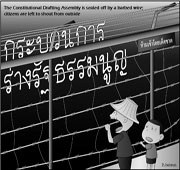The Issue
 A country’s constitution is its cornerstone in protecting the rights and liberties of its citizens, as well as setting out a framework for political, economic and social governance. Without an adequate framework, society cannot be effectively governed by the rule of law.
A country’s constitution is its cornerstone in protecting the rights and liberties of its citizens, as well as setting out a framework for political, economic and social governance. Without an adequate framework, society cannot be effectively governed by the rule of law.
This framework of governance must represent the will of the people, and its rules and regulations must be those consented to by citizens. Without this consent, no constitution can be truly democratic or legitimate. It is unfortunate that while many Asian countries have so called constitutions, these do not in fact represent the will of the people. Furthermore, these constitutions are not always used as a framework for governance. For this reason, there is little effective rule of law in the region; instead, violence, corruption and human rights abuse prevail.
The Lessons
Lesson 1: Discussion of constitutionalism and its relationship to human rights
Lesson 2: Case study of the 1997 Constitution of Thailand